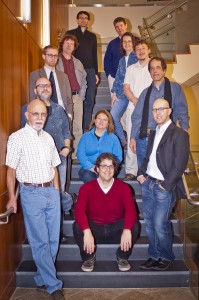Given the frequency and range of public events on campus, it’s easy to miss some of the most scholarly events that take place just under the radar.
On March 17, Colgate’s geology department hosted 10 scholars for an interdisciplinary dialogue about the destabilization of ecosystems in the northeastern US, due to human-induced habitat destruction, climate change, and biodiversity loss. Participants in the Mass Extinction workshop brought perspectives of philosophy and ethics, as well as ecology, biology, paleontology, and of course geology.
“Without a doubt, the workshop turned out to be the most sustained intellectual effort that I have ever engaged in,” said Paul Pinet, professor of geology and environmental studies at Colgate, who organized the meeting along with Jeremy Bendik-Keymer, a philosopher from Case Western Reserve University. “The interactions that self-organized and the queries that emerged from those intellectual couplings were continually deep, complex, innovative, and dynamic.”
Pinet (front row, left) said the group outlined two papers for future publication and discussed meeting again as their ideas evolve. “If we do, we plan to engage other specialists with the complex ecological, geological, and moral issues that are embedded in the elevated extinction rates of the present,” he said.
Next up:
On March 30–31, Colgate’s peace and conflict studies program will bring “Wars beyond war: Mass violence in an age of terror, catastrophe and the responsibility to protect.” Scholars from China, Sweden, Canada, the UK, and prominent universities across the US will engage in two days of presentations and discourse. From 4– 5:30 p.m. on Friday, there will be a moderated public forum on the future of warfare at the Colgate Bookstore.
